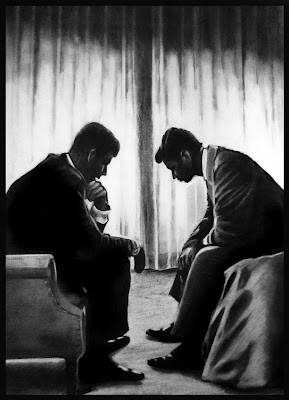The sun was setting.
His body was aching, his soul groaning, and his mind racing.
The burden of knowing that on his shoulders he was carrying the weight of a decision so immense, so important, that it was possible that the future of the whole planet rested upon it made his stomach churn and made him feel queasy. He stood up and walked to the window.
The oval office was warm and comfortable, yet he felt the chill of the autumn winds searing through his bones.
Would Khrushchev accept his proposal?
Would reason prevail, an agreement had, or was this the end?
A soft tap on the door brought him back from his mellow thoughts.
-Bobby, come in, come in.
-You look just as bad as I feel, how are you doing, Bobby?
Bobby entered the oval office, walked up to his brother, gave him a quick tap on his shoulder then sat down on one of the couches.
John walked up to one of the easy chairs and dragged it close to Bobby.
Like so many times before, John sought the counsel of his brother to help him navigate through the tough decisions that had to be made.
Reason did prevail, an agreement agreed upon, and a nuclear war was averted.
A few years later however, both of them were dead, both murdered, both in the prime of their lives.
Now, not so many years later, once again the threat of a possible nuclear war looms large across our planet.
I don't know about you, but I can't help but wonder what goes on inside of people in power that makes them even entertain the thought that creating weapons that can exterminate all life on our blue planet is a good idea.
What is it about power that can so corrupt a mind that it "blinds" it to compassion, empathy, and the sanctity of life? Paraphrasing Lincoln: "If you wanna test a man's character, give him power."
Some suggest that for someone with high ethical standards, gaining power does not necessarily have to corrupt, power only corrupts someone who before gaining power already had dubious ethical standards.
People with a high moral identity tend to show a greater understanding of how their actions affect others. This is often accompanied with a broader and more communally orientated perspective than those who register a low moral identity. (According to some research)
I take this to mean: Power does not necessarily corrupt, but it does heighten preexisting ethical and moral standards.
(For some of us, "power can go to our heads" they say, especially if that power gives us advantages over others in different social or personal settings.)
"The measure of a person is what he(she) does with power", according to Plato.
So, who had the power to order the assassination of: Abe Lincoln, J. F. Kennedy, Robert Kennedy, Mahatma Gandhi, Julius Caesar, Martin Luther King Jr., Malcolm X, etc.etc. ?
(The thing with being a person of power is that such a person does not have to do the actual "deed" themselves, that will be allocated to someone else. The CEO orders someone else to fire the 1.200 employees, close the factory, put the business into liquidation, shut down the school, etc.etc.)
Some people seek power in order to be able to exert control over /in their own lives, some seek it to exert control over their own and others lives, some seek it in order to contribute to affecting change for the betterment of mankind, and some seek it for personal political, financial, material, etc.etc. gain.
"Power", said Chairman Mao, "comes from the barrel of a gun", "Power that comes from the barrel of a gun is only effective for a short time, in the end, peoples love for truth, justice, freedom and democracy will triumph. No matter what governments do, the human spirit will prevail", says the Dalai Lama.
Right on, Dalai Lama, I am with you.
(ps: the black and white image is a graphite drawing)






